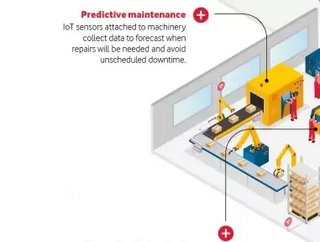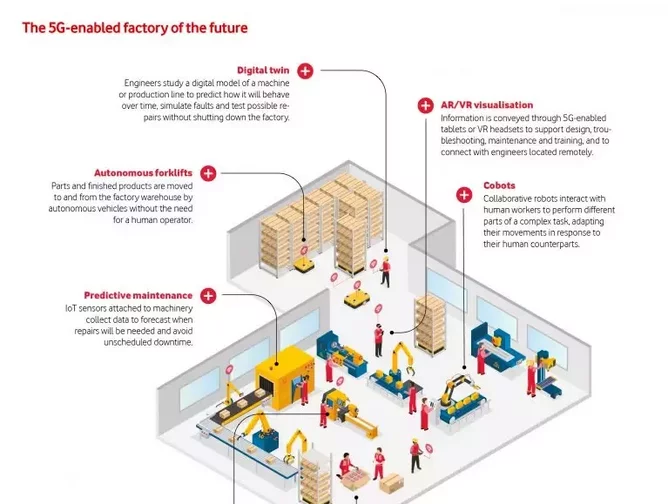Vodafone: 5G could add £6.3bn to UK manufacturing by 2030

A new report from Vodafone suggests that 5G could add as much as £6.3bn to UK manufacturing by 2030.
The report – Powering Up Manufacturing, Levelling Up Britain – employed economic analysis from WPI Economics to scope 5G’s impact on the manufacturing sector nationally.
Boost for 5G adoption
Vodafone’s paper calls on government to set ambitious targets for 5G adoption in manufacturing over the coming decade, including support for industry to invest in private 5G networks and 5G testing and innovation centres with a view to harnessing the benefits of IoT and edge computing in manufacturing.
Key areas of the report
- Wirelessly connected factories with bespoke 5G mobile private networks (MPNs) can support the sharing of large quantities of data from thousands of devices simultaneously in real time, enabling better and faster decision making, facilitating machine learning and allowing processes to be adapted to maximise productivity.
- 5G allows for predictive maintenance. This means monitoring hundreds of variables, forecasting when and where repairs will be needed and avoiding expensive unplanned downtime.
- 5G-supported Augmented Reality (AR) and Virtual Reality (VR) technology can be used to visualise and plan designs in detail prior to the construction of physical prototypes. This will help workers to maintain and repair failed machinery and enable workers to be trained with less direct use of expensive physical machinery. 5G-supported AR and VR technology can also connect workers on a factory floor with engineers and designers located elsewhere, enabling them to access technical expertise without costly and time-consuming site visits.

Beginning the 5G journey
Anne Sheehan, Business Director, Vodafone said: “We are only beginning the 5G journey, but through our work with Ford, we know it offers huge potential for the manufacturing sector and beyond.
“To realise this potential, we need to all get behind it, from Government and Ofcom creating the right policy and regulatory environment, through to businesses embracing the power of innovation, and, of course, us as network operators creating this network of the future.”
Minister for Digital Infrastructure Matt Warman said: “5G can change the way Britain builds and we’ve sparked a wave of innovation in UK manufacturing through our £200m 5G trials scheme.
“We’ve seen driverless vehicles at Nissan’s Sunderland plant, VR at BAM Nutall building sites in Scotland and Vodafone boosting laser-welding robots in Essex.
“The benefits of 5G for improving productivity, efficiency and safety in our manufacturing sector and beyond are clear, and Vodafone’s report is a ringing endorsement of how this revolutionary technology can help us build back better from the pandemic.”






